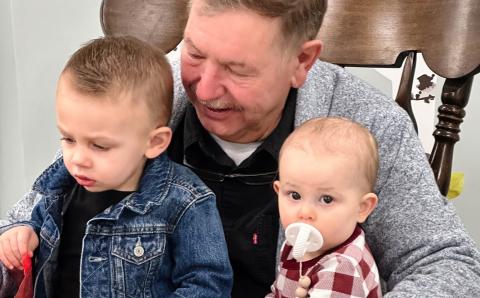I have a control issue. By God’s grace I am better at keeping it in check now, but I still struggle with the desire to be in control. By this I do not mean “bossing people around.” It is much more subtle than that. It is about spiritual control.
For years, I was not aware of my control issue—because it was cloaked in spiritual piety. I was guilty of practicing “righteousness by good doctrine” (Herman Bavinck, The Certainty of Faith, p. 26).
When I was 19, my sister gave me a Bible, and inside the front cover she wrote down 2 Timothy 2:15: “Do your best to present yourself to God as one approved, a worker who does not need to be ashamed and who correctly handles the word of truth.” I took that to heart. I was already an ardent student of Scripture. I read Bible commentaries and books on systematic theology. When I was still in high school, my pastor entrusted me to lead an adult Bible study class in his absence. I had striven to master God’s Word. But therein lies the problem. God and God’s Word should be mastering me.
In my zeal to master the knowledge of God’s truths, I failed to notice that my faith became rationalistic and that I was feeding my lust for power and control. As Francis Bacon said, “Knowledge is power.” Knowledge of God’s truth gave me intellectual power. It gave me a sense of intellectual control and security. I have the answers—or at least I can easily find them in God’s Word. I can even use them to have power over others.
I had inadvertently turned Scripture into a tool under my control. I had assumed that correctly handling Scripture meant I should master Scripture, and the more I mastered it, the more holy or spiritual I would be. The more correct my doctrinal beliefs were, the more righteous or “approved” I would be before God. In sum, it was a spirituality of mastery and control.
Only in later years did I notice that I had overemphasized the apostle Paul’s metaphors of workmanship and athletic training that suggest mastery and control. But Jesus also gave a metaphor of vulnerability: “Truly I tell you, unless you change and become like little children, you will never enter the kingdom of heaven” (Matt. 18:3). Children are not masters. Children in Jesus’ time were the most vulnerable group around.
I remembered how I gave my life to Jesus, praying with tears flowing down my cheeks. I confessed my sins. I was vulnerable before the Lord, begging for his mercy and grace. Despite having entered God’s kingdom with a posture of vulnerability, I somehow felt I could grow spiritually through a posture of mastery. But that was my spiritual pride disguised in doctrinal righteousness.
I used God’s truths as an intellectual shield to hide my inner self from God. Having all the answers shielded me from being vulnerable before God and before others. It was a subtle way to keep God at a distance, if not in a box. Despite my professed theology, I lived like I, rather than God, was in control of my spiritual life.
Is this how the Pharisees could master the Scriptures yet have their hearts far from God (Mark 7:6)? I don’t know for sure, but now I try to walk humbly and vulnerably with God.
About the Author
Shiao Chong is the former editor-in-chief of The Banner. He served as editor from 2016 to 2025. He attends Fellowship Christian Reformed Church in Toronto, Ont.
Shiao Chong es el redactor jefe de The Banner. El asiste a Iglesia Comunidad Cristiana Reformada en Toronto, Ont.
시아오 총은 더 배너 (The Banner)의 편집장이다. 온타리오 주 토론토의 펠로우쉽 CRC에 출석한다.
You can follow him @shiaochong (Twitter) and @3dchristianity (Facebook).









